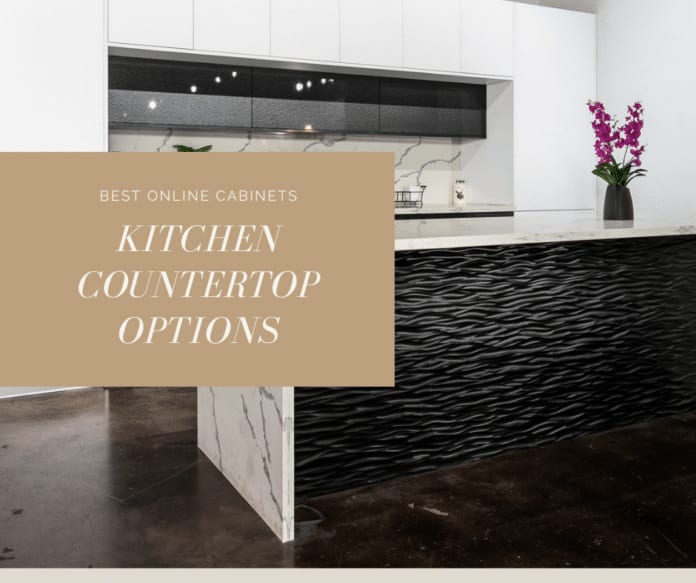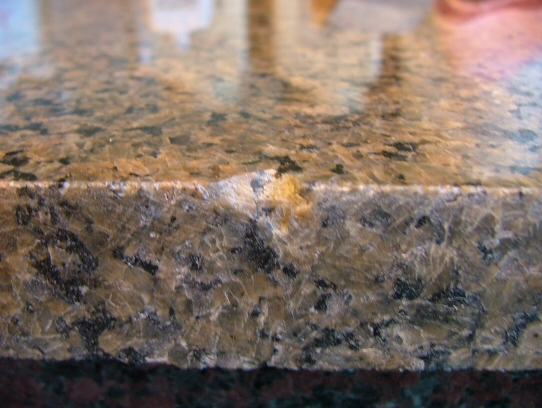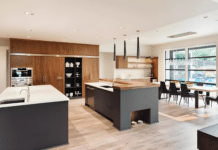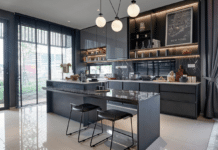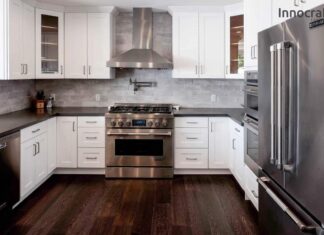Most kitchen remodeling projects include replacing the countertop. Countertops are used frequently in the kitchen, so they must be durable and complement the design. Custom kitchen countertops can be made of various materials, colors, textures, and prices.
When To Replace Countertops
Countertops are usually replaced during a kitchen renovation. When they become damaged, cracked, or difficult to maintain, it is time for new ones. Before replacing them, it is important to research the types of countertops available and the cost.
It is a good idea for the customer to understand what type of countertop will work best in their kitchen and suit their use.
The first step in the research process is to measure the existing countertop and determine the length and depth of each section. If an entire kitchen redesign is planned, then the measurements should be taken from the new layout.
Countertop Dimensions
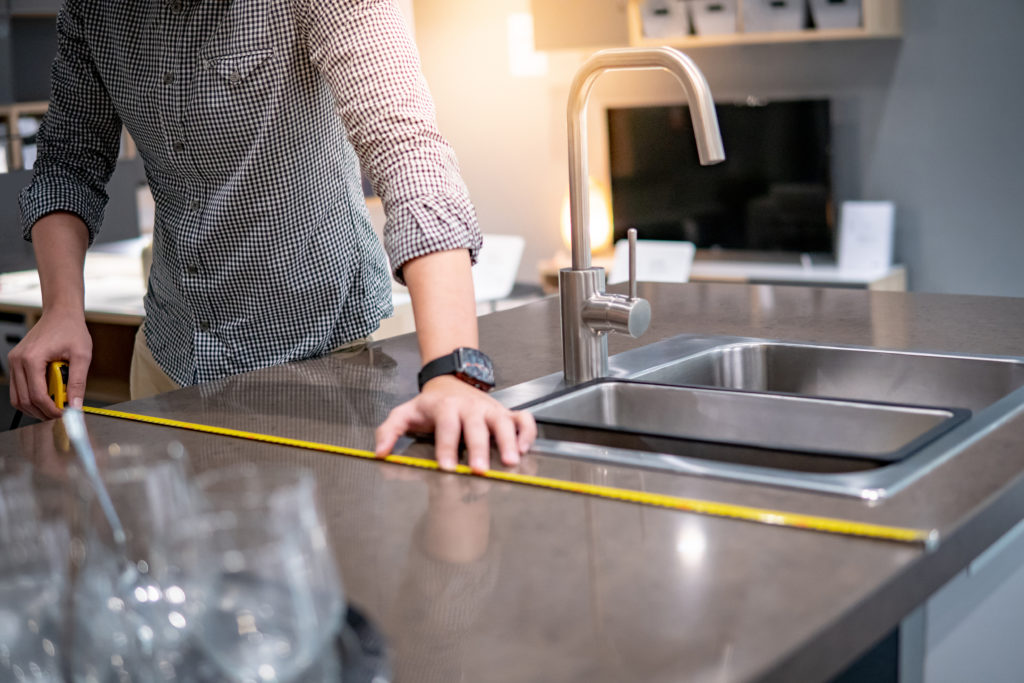
Countertops can be custom-made to the owner’s specifications or purchased ‘off the shelf.’ While there are no standards for overall countertop dimensions, the width of a kitchen countertop is usually standard, with less than an inch of variation from one model to the next.
The most common width is 25 inches, so many carriers sell countertops by the linear foot. These countertops are made to fit over a standard 24-inch deep base cabinet.
Some stores sell pre-cut countertops in standard lengths, for example, 6 or 8 feet. Customer countertops in any length that will fit a specific space must be ordered and are not available for purchase right away.
The depth of the countertop varies depending on the material. Most countertops are in the range of 1 inch to 1.5 inches deep.
Stone materials like quartz are thicker, so countertops are available in ¾ and 1 ¼ inch depths. Thicker countertops are best for kitchen areas that get used often.
Kitchen Countertop Uses
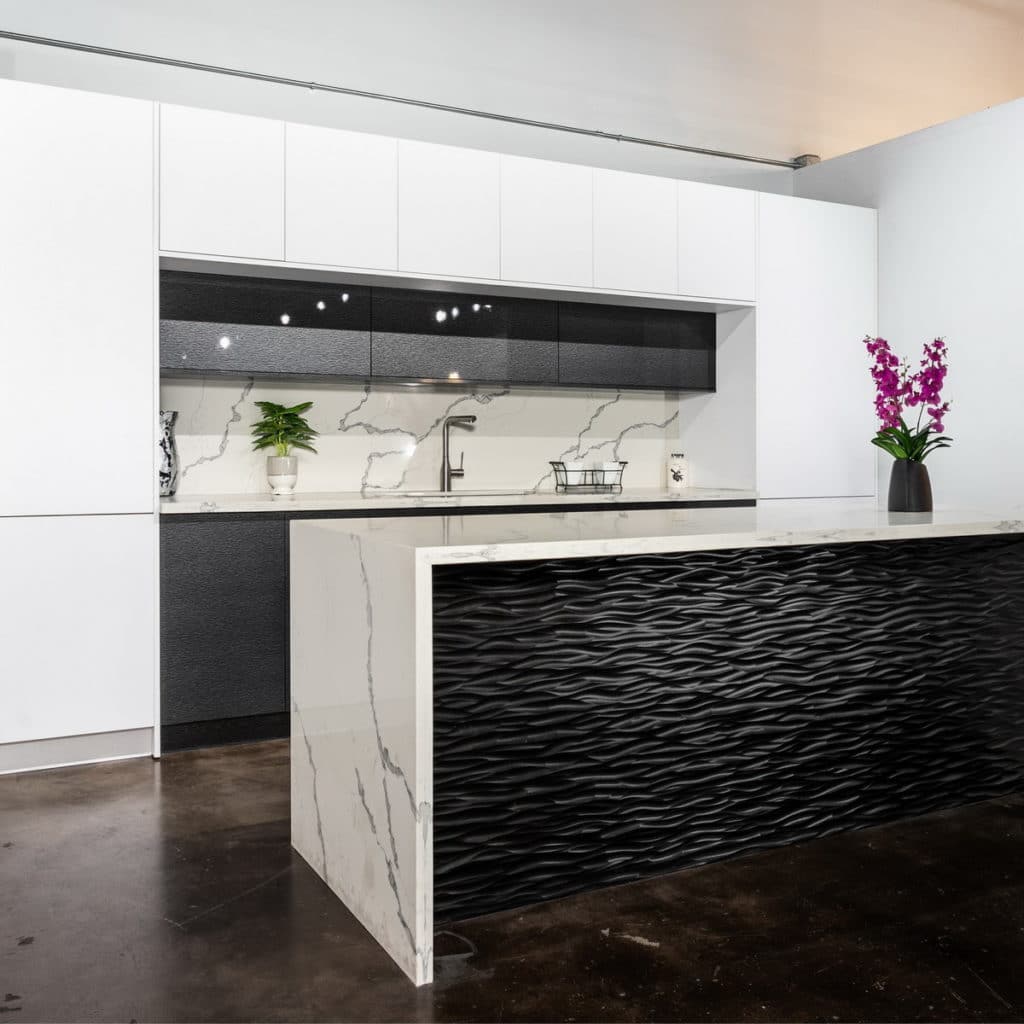
Kitchen countertops are not only used for the sections to cover base cabinets. Countertops can be used on kitchen islands or peninsulas, which differ in size.
They can also be used for a waterfall effect, which drops vertically instead of stopping at the edge of the cabinet or island. This creates a flow that links the floor to the cabinetry.
A new countertop also means a new backsplash. The backsplash must be replaced simultaneously with the countertop and should complement it.
Some homeowners use the same or similar countertop material for the backsplash but break it up using a tile format rather than a slab. This creates a continuous look throughout the kitchen.
Tips for Choosing a Kitchen Countertop
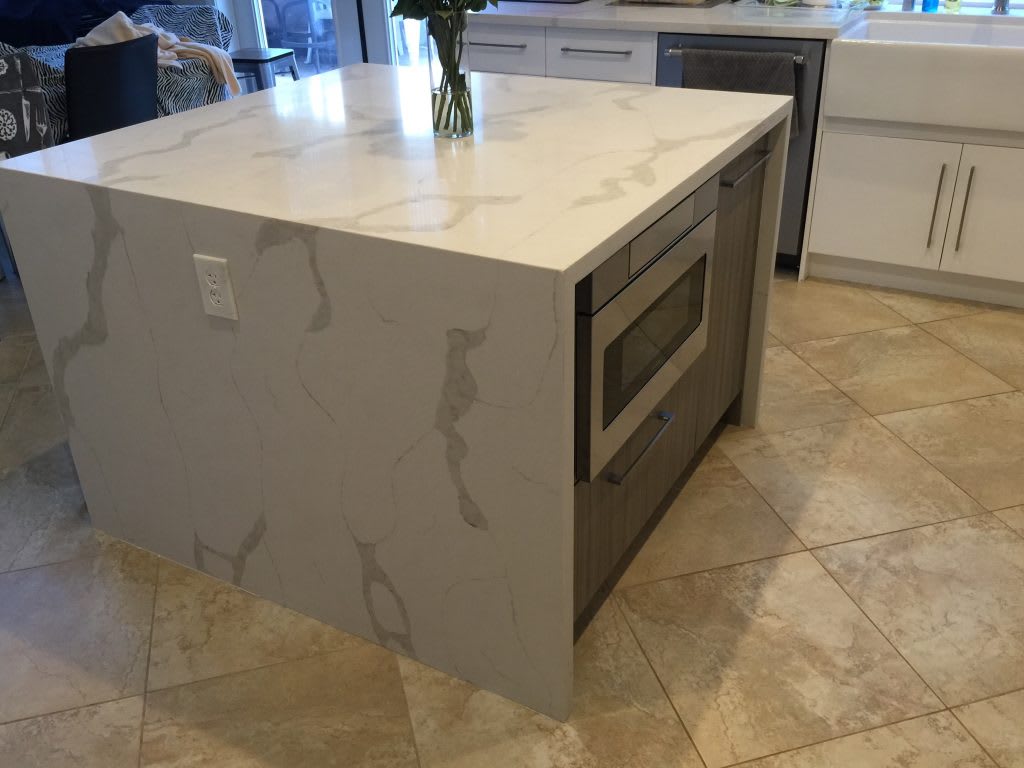
Before replacing kitchen countertops, the homeowner should consider all of the options within budget. All countertop materials have advantages and disadvantages, so maintenance requirements, attributes, and aesthetics should be factored in.
For example, granite and marble might need to be resealed and polished occasionally. Other countertop materials, such as laminate, are generally maintenance-free.
Homeowners should expect to spend 10-15% of the kitchen remodeling budget on countertops and installation. Keeping within this range will ensure the homeowner does not overspend on the countertops. Homeowners might also consider the design and use simultaneously.
For example, a different color countertop on an island can differentiate workspaces and add to the design of the kitchen.
Colors and trends will change, so homeowners must choose one they can live with for years.
If the homeowner intends to sell, the countertop should not be too trendy, as it will not appeal to future buyers. It should complement the kitchen cabinets and the overall style of the kitchen.
Tip: If you are swapping out just the countertop and the new one is substantially heavier, make sure the existing cabinets and floor can support the additional weight.
The cabinets should be able to withstand the weight of a heavy countertop, but reinforcement at the base, sides, back, and top might be required.
Countertop Materials
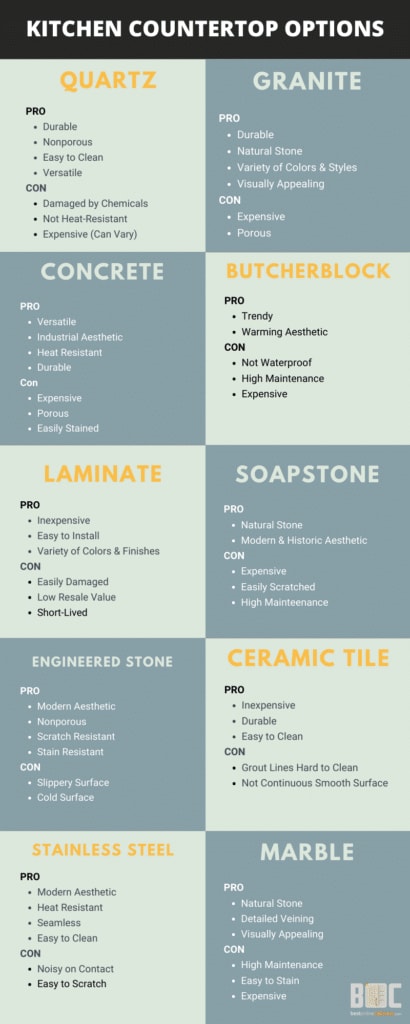
There are a variety of countertop materials to fit any customer’s preference, use, and budget. Since the countertop is an investment that does not get replaced often, it is recommended that the homeowner carefully consider all options.
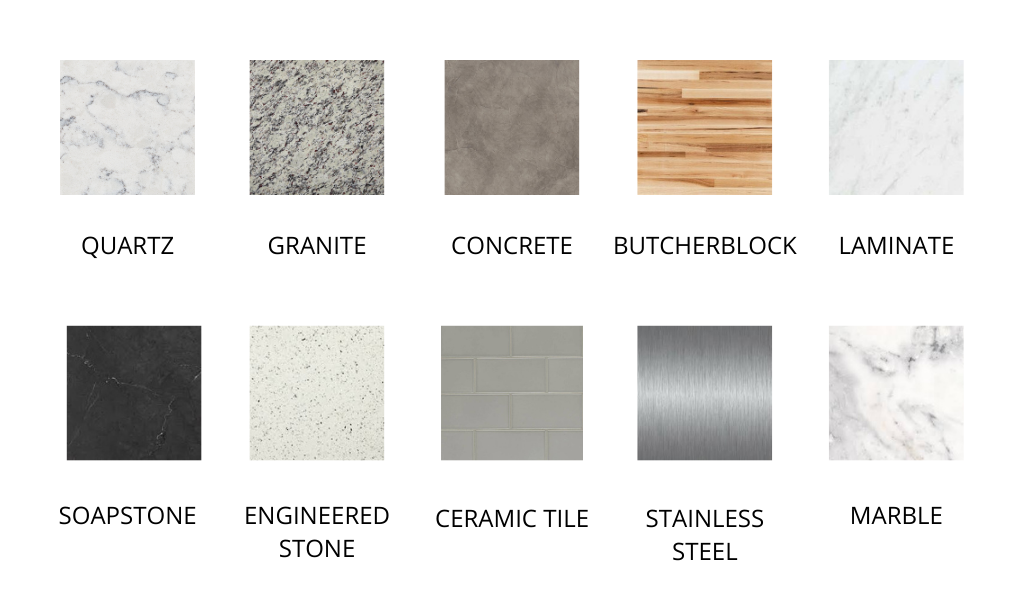
Quartz
This countertop is a type of engineered stone. It contains about 93 percent quartz particles, and the remainder is resins. The slabs are uniform. Some customers consider quartz better-performing than granite because it also resists scratching and staining.
Available in various colors, some look like marble with similar veining. Quartz does not require sealing, so it requires less maintenance, but chemicals like bleach can damage it. These countertops are very heavy and expensive.
Cost: $50-$100 per square foot installed.
Granite
Granite countertops are usually viewed as the material of choice when there are no cost considerations. This stone has variation in its color because every piece is unique.
With nearly 3,000 different colors and types, every homeowner can find one to suit their tastes. Even a modest kitchen can appear more high-end with the use of granite.
It can also add value to a kitchen. Homeowners should know that seams are more evident in granite, and hot substances can stain unsealed tops.
Overall, however, it requires little maintenance other than occasional re-sealing.
Cost: $75-$125 per square foot installed
Concrete
Concrete can be a good choice for a unique countertop. It provides a modern and custom-formed look, which adds to the cost. This type of countertop has many textures and colors.
While concrete tends to crack, new technologies can reduce this tendency. Since the surface is porous, it must be regularly sealed.
Cost: $60-$120 per square foot installed
Butcher Block
Wood countertops add warmth and depth to any kitchen. They come in various colors and finishes, but maple and oak are most often used. If properly maintained, wood countertops can last long and be sanded and resealed when necessary.
Over time, knife cuts or water stains can damage the surface. Wood countertops require more maintenance than other materials, as the wood can crack if not oiled and sealed often.
Cost: $40-$100 per square foot installed
Laminate
Laminate is one of the least expensive countertop options. However, it will chip and show scratches and may not last as long as other options.
Laminates are plastic-coated synthetics with a smooth surface that is easy to clean. These countertops have become more popular recently, especially with retro designs in mid-century modern kitchens.
DIY homeowners can even install laminate themselves. However, there are a few disadvantages to choosing laminate. Hot items like pots cannot be placed directly on it, and any damage, such as chips or scratches, is impossible to repair.
In addition, seams in laminate are always visible.
Cost: $40-$65 per square foot installed
Soapstone
Soapstone is a natural stone that is softer than granite. It is usually a dark, rich color with a smooth surface. A soapstone can be seen in both historic and modern houses.
Over time, it becomes similar to an antique-like patina. It is more susceptible to stains and scratches and must be maintained with mineral oil.
Cost: $58-$75 per square foot installed
Solid Surface
Solid-surface countertops, made from acrylic and polyester blends, are available in various colors, textures, and styles. This nonporous material is ideal for food preparation because it does not stain.
It is durable and can be formed into any shape or size. Burns and scratches can be sanded and buffed out.
Homeowners who do not like to see the seams in their countertops will prefer this type of material. A solid surface countertop is an excellent option for a mid-range kitchen renovation.
Cost: $45-$75 per square foot installed
Engineered Stone
This countertop combines natural stone with solid surface materials. About 95 percent of engineered stone countertops are made of crushed natural stone, like quartz, and the remaining 5 percent are made of synthetic resins.
The advantages are that they are nonporous and scratch—and stain-resistant. They are very durable and have a hard surface, but they can be slippery and cold.
Cost: $65-$85 per square foot installed.
Ceramic Tile
Ceramic tile is less expensive than some other countertop materials. Made from individual clay-based tiles adhered to a cement board core, it is durable and easy to clean. A DIY homeowner can install it.
Porcelain tiles are now available in many different design options and can mimic marble or wood. However, the grout lines between the tiles can be hard to clean. Larger tiles can minimize the number of seams to make it easier to keep clean.
Cost: $35-$40 per square foot installed.
Stainless Steel
No longer solely for restaurants, stainless steel brings a modern aesthetic to a home kitchen. Stainless steel countertops are heat resistant and made to specifications, so they will not have seams, are easy to clean, and are germ-resistant.
On the downside, these countertops can be noisy and scratch easily. Cost: $35-50 per square foot installed.
Marble
Marble is another natural stone option, but it does have limitations. Homeowners highly seek out its unique appearance and veining. It is relatively soft and stains easily, so it must be resealed often.
It is also one of the more expensive materials. Marble is most likely not the best choice for a large family that uses the kitchen for many activities.
Cost: $40-$100 per square foot installed
Conclusion
Choosing a material for a kitchen countertop is a huge decision because it impacts the kitchen’s design and function.
A countertop chosen after a thoughtful decision process can add value to the homeowner in its functionality and overall aesthetic. The range of materials available for kitchen countertops is diverse, and one can be found to fit any budget.

